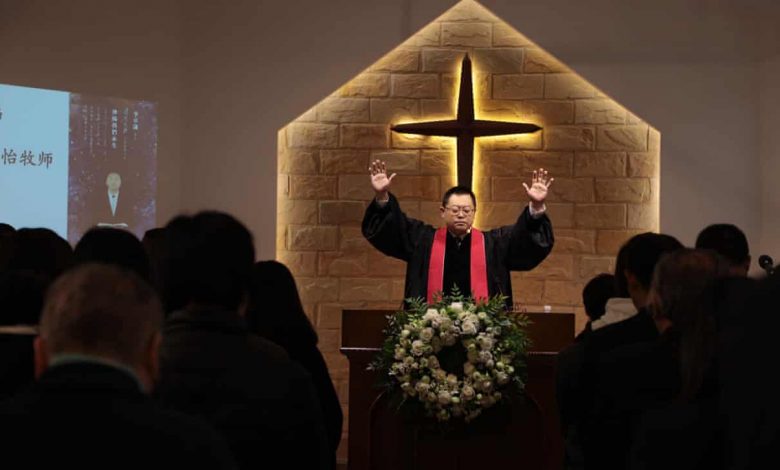It’s goodnews to religious groups. Read full HEALTH & SOCIAL MEASURES IN PLACES OF WORSHIP HERE.

The religious leaders propose to adopt and implement the following array of public health and social measures that will help to prevent and suppress transmission of the virus.
- PROMOTE HEALTHY HYGIENE PRACTICES
Religious leaders will help congregants to maintain healthy hygiene practices by;
Providing handwashing facilities for members before and after the service or by placing alcohol-based hand-rub (at least 70% alcohol) at the entrance and in the worship space.
Ensure congregants maintain good hand hygiene, washing hands with soap and
water for at least 20 seconds.
Place disposable facial tissues within easy reach and closed bins for used tissues
Provide visual displays of advice on physical distancing, hand hygiene, and respiratory etiquette (cough and sneezing).
2. IMPLEMENT PHYSICAL DISTANCING
COVID-19 is spread through respiratory droplets when an infected person sneezes, coughs, or talks. These droplets can land on people or be breathed in by those close by. Houses of worship will help to prevent/slow the spread of the virus through the following measures;
Seating or standing of congregants in worship services will be at least 1.5 m (4 feet) apart. Encourage attendees to sit with their family unit during the service.
Physical distancing at services and other gatherings like weddings and funerals will be
implemented.
Religious leaders will take steps to limit the size of gatherings. They will consider multiple
services with fewer attendees if need be.
Scheduling of services will be far apart to allow enough time for cleaning and disinfecting
high-touch surfaces between services.
Regulate the number and flow of people entering, attending, and departing from worship
spaces to ensure safe distancing at all times.
Places of worship are strongly advised to hold a maximum of one mid-week service. Every single service will be held for a maximum of 2 hours
Identify a room or area where a person could be safely isolated temporary if he or she becomes ill or begins to develop symptoms during service. Notify the nearest health facility or call the toll free lines provided by the Ministry of Health (0729471414, 0732353535, 0748592455, 0800721316 (Toll free)
ENSURE USE CLOTH MASKS
Cloth masks are meant to protect other people in case the wearer is unknowingly
infected but does not have symptoms.
Adherence to the use of cloth masks that covers the mouth and nose among
congregants will highly be encouraged except for children younger than 2 years old. The ministers and those leading worship may not use the mask while ministering but will ensure the required physical distancing is maintained.
3. PROTECTING THE VULNERABLE POPULATIONS
The Religious Leaders recognize that part of the congregants are vulnerable populations. These include the elderly, those with underlying health conditions like diabetes mellitus, cardiovascular diseases, cancers and other chronic diseases. When conducting services, houses of worship will implement the following practices:
Ask all attendees who have an underlying at-risk health conditions to stay home and if
possible watch the services online.
Ask all attendees who are elderly (> 65 years) to stay home and if possible watch the
services online.
Ask parent not to bring young children to places of worship, unless the house of worship will be able to comply with guidelines for child care facilities that may be provided by the government.
Advise those with exposure to a person diagnosed with COVID-19 to stay home and self-
monitor for symptoms as per government guidelines.
Any worshipper who has COVID-19 like symptoms (dry cough, sneezing, fever, difficulty in breathing…) should avoid attending worship services.
4. CLEANING, DISINFECTION, AND VENTILATION
Develop a schedule of increased, routine cleaning and disinfection. This routine should
include cleaning immediately before and immediately after all gatherings.
Frequently clean often-touched objects such as door knobs, light switches, and stair
railings with disinfectant.
Ensure that indoor venues have adequate ventilation to increase circulation of outdoor
air as much as possible by opening windows and doors, using fans, etc.
If the indoor venue has limited ventilation, consider holding services and gatherings outdoors, as circumstances and faith traditions allow.
5. PREVENT TOUCHING BETWEEN PEOPLE ATTENDING SERVICES AND MINIMIZE COMMUNITY SHARING OF MATERIALS AND ITEMS
The virus that causes COVID-19 can remain on such surfaces for hours or days. Religious leaders will protect their members from becoming infected by avoiding practices involving touching of such surfaces, objects or people. Religious leaders will create and help congregants to accept new ways including and not limited to the following;
Physical contact (e.g. shaking hands, hugging) will strictly not be allowed. Instead, replace hugs and handshakes with greeting people at the entry to worship place with friendly words and smiles, a peace sign or using a greeting in sign language while maintaining physical distance.
Laying of hands by the clergy is temporally prohibited during service in the current context of COVID-19. Instead congregants will receive prayer/blessing from at least 1 m away.
Administer Holy Communion without attendees having to touch the same surfaces and
objects.
Eliminate practices involving touching such as foot washing or dipping fingers into a
common bowl.
Avoid sharing of microphones during the service among the clergy, choir, praise and
worship teams.
Temporarily limit the sharing of frequently touched objects, such as hymn books, bulletins, prayer books, prayer mats or other items passed or shared among congregants, and encouraging congregants to bring their own such items. If possible, photocopying or projecting songs, and texts using electronic means.
Modify the methods used to receive financial offerings/contributions. Encourage the use of mobile money transfer. Where not possible, consider a stationary collection box instead of shared collection trays or baskets.
6. TEMPERATURE MONITORING AND RECORD KEEPING
Every house of worship is encouraged to put measures in place to monitor temperature of the people coming to the houses of worship. Any person with temperature reading 37.5°c or more will not be allowed to enter in the place of worship. Temperature monitoring will only be done by using appropriate devices like digital infrared thermometer gun.
Caveat: None compliance to these guidelines does not include temperature monitoring using digital infrared thermometer gun because of access and cost implications. Religious leaders appeal to the government to assist places of worship with infrared thermometer guns.
Records of people attending worship service will be kept safely by the religious leaders. The list will contain at least; two names, allocated seat number, telephone number and place of residence for each worshiper. Confidentiality will be maintained, however, the information may be shared with health authorities for the purpose of contact tracing only if need arises.
IV. MONITORING IMPLEMENTATION OF THESE GUIDELINES
Religious leaders with support of government administrators and health officials will be responsible for ensuring these guidelines are implemented in their places of worship through the following;
- Every place of worship will establish a COVID-19 Response committee that will be responsible of implementing the guidelines.
- Health authorities will support in carrying out trainings for the religious leaders on these guidelines at the ward level.
- Religious leaders will work with the health officials and government administrators to establish an all-inclusive COVID-19 Response committee at the ward level or sub county level that will among other things monitor implementation of the guidelines in their localities.
- Religious leaders through their governing structures and umbrella bodies will establish a framework for monitoring and evaluating implementation of these guidelines from time to time.
V. NONE COMPLIANCE WITH GUIDELINES IN PLACES OF WORSHIP
Any place of worship that does not institute these public health and social measures as outlined in the guidelines (except for temperature monitoring) to keep their community safe, the ward COVID-19 committee may suspend gatherings in such place of worship for public safety until when all the necessary plans are put in place.
N/B: These guidelines are only applicable in the current context of COVID-19 Pandemic and will thereafter be null and void.
VI. UPDATING OF THESE GUIDELINES
The government and the religious leaders may update these guidelines from time to time based on lessons learnt and prevailing circumstances.






